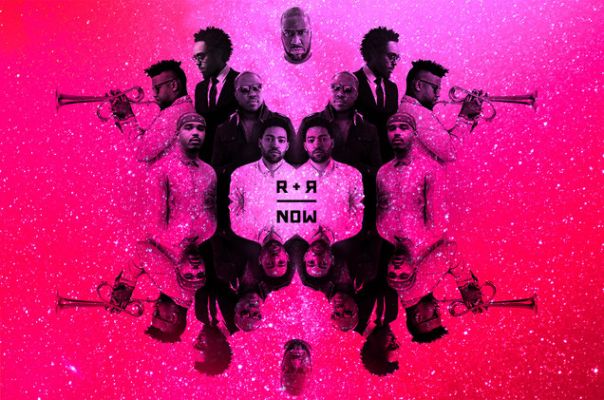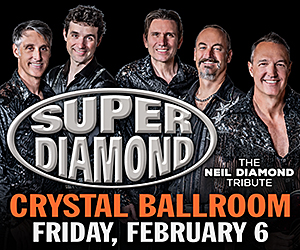Home > Jazz / Blues
04/21/2018
BEST OF 2018: The Generosity of the Robert Glasper’s Jazz Supergroup R+R = NOW at the Roseland Theater April 19, 2018
By MICHAEL CONLEY // BEST OF OMN 2018: The tone is brash and confident; these are skillful players in their prime. It was easy to imagine any one of them going back to their hotel thinking they had just done what track & field athletes refer to as their "personal best."
We're presenting OMN's best of 2018 as we ease into 2019. We've asked our writers to pick the story of their own that they liked the best in 2018. We have been fortunate to have Michael "Shoehorn" Conley reviewing performances for us because he approaches them as a musician, something greatly lacking in most music journalism. Look for his stories during the upcoming PDX Jazz Festival 2019. -- TVD
This concert was presented by Soul’d Out Music Festival. I arrived at the Roseland Theater to see a line down the block, which is always a good sign, especially for a jazz gig. It turned out there was simply some kind of delay. Once I got inside I took a look at the stage- there were 3 keyboard stations: one with an actual Fender Rhodes electric piano plus a couple of Yamaha keyboards, another one with a pair of instruments including a Korg Kronos, and the third keyboard station had shorter, more compact instruments and a laptop computer set up with an unruly snarl of wires billowing to the floor.
This 3rd set-up boasted some units from the Novation company, which makes instruments popular with electronic music producers, including devices like grids of colored lights which actually are rows of buttons used to initiate musical "events", triggering software. There was also a bass rig and a drum set, and a couple of microphones.
I really did not know what to expect, but I have been reading about Glasper for years in the Jazz press and Scott was featured on a recent Downbeat cover. At this point in the evening there was a DJ set up downstage, and he rocked the now-standard headphones and bipped around a bit behind his tables. This was not the most compelling choice to open a show like this- the skills this DJ brought would have been better suited to an after party. This was increasingly apparent as his set went on, for 80 minutes.
When Glasper's band finally took the stage he introduced bassist Derrick Hodge, Justin Tyson on drums, Terrace Martin on keyboards, vocals and sax, Taylor McFerrin on the the shorter keyboards, and trumpeter Christian Scott Atunde Adjuah. R+R=NOW.
Their first tune was a version of "Butterfly" by Herbie Hancock, starting with a voice & keys intro by Martin. There was a lot of electronic treatment on his vocal mic and in his accompaniment he favored gauzy, reedy synth patches from his keyboard. I'm sure some listeners find this type of sound a little bit grating and commercial-sounding, especially on the voice, but it did fit with the aesthetic of this band which draws heavily on old-school R&B, fusion Jazz, hip-hop, and Progressive Rock for its sonic palette.
When Christian Scott stepped up to the mic for his first solo, I was immediately struck by the hard, almost rock synthesizer-like tone that he was getting on the horn. He was playing through pedals and effects but he also flashed plenty of hard-core chops, power, and energy, with the faint echo of Armstrong in his confident soaring lines.
After this Martin picked up his alto saxophone and surprisingly got the audience singing along very quickly to a simple two-note motif- he has a certain charisma for sure- and his tone, while a bit bright and edgy compared to my own preferred alto tone, was well-matched to the sonics of the band, and cut through. As a saxophonist myself I was quite impressed with the presence his saxophone had in the mix, and could only marvel at what it would be like to be so well-defined in an electric setting like that with the heavy drums and bass and several keyboards.
"Go to Sleep and Wake Up Next to You" featured a long, patient build of deliberately constructed textures in Glasper's keyboard parts. The group is good at building tension and often this tension is released not by a harmonic resolution but when the soloist or a subset of the players drops out and leaves space to breathe for the rest of the band. These spots functioned as natural applause points.
After this we were treated to a cool, quite busy drum workout, with a backbeat but crammed with subdivisions packed close together in volleys of cascading strokes. Many of today's drummers, including Tyson, have found a way to mimic the type of untiring beats originally created by electronic instruments, but with the added spontaneity and flow of a human artist. Scott ripped another commanding solo on this one with his notes matching the energy of the relentless drum part, followed by a brief passage featuring the bass.
At this point Glasper quipped "That s*** at the end was just made up!" explaining that it was only the band's third gig, and referencing the fact that they created these tunes in the studio during a recording session in February, with the album due to drop in June.
Glasper then presented a couple of songs from his career-making hit "Black Radio", which became another singalong with fans responding "Oh yeah, oh yeah, oh yeah" and the leader singing a line starting with "I think beauty's overrated". This went on to feature some playful back and forth between Martin on a high vocal part answering Glasper, who got a little goofy and playful with it.
Another one of his lyrics was something to the effect of "When I Call You Always Answer the Phone". Apparently Jill Scott sang it on the record, and Glasper remarked that he couldn't remember the words, looking offstage saying "Jill come on out here". The audience gasped in delighted anticipation only to be deflated by Glasper saying "I got you!" chuckling "April 19th Fools", before going on to name-check some artists that paved the way for him, including Ms. Scott and Erykah Badu.
Razzing Terrace Martin a bit about the popularity of their respective catalogs, Glasper was interrupted by Martin yelling "Hey everybody, tell Robert to shut the f*** up!" which was kind of a shocking bit of stage banter from the show business standpoint but was pretty funny to the crowd.
Martin proceeded to talk about Portland and how it's good to be here and how Portland has the best weed, to cheers, then said "actually second-best to LA" to some mild booing. Martin responded that if they're going to be representing they need to throw a joint up there on stage. Someone soon did, and after he got the audience to chant "Light that s***, light that s***, like that s***" he did actually light the joint on stage and took a couple puffs, eliciting approval from the 420 contingent.
This atmospheric priming gave way to some solo chords by Glasper, creating a mellow vamp before announcing Taylor McFerrin, who grabbed a mic, and still standing behind his Novation keyboards, started beatboxing with virtuoso skill, intoning drum and bass sounds.
This display caused me to note that beatboxing should not be overlooked or dismissed by Jazz fans because it's got something unique going for it as a vocal technique. Since beatboxers can continue creating sound while they inhale, it makes for a continuous flow of tones like circular breathing. McFerrin almost sounded like he was looping- with a constant stream of sound coming out of his mouth without any time lost for breath. Rather like a harmonica in comparison to a flute or a sax.
None of this would be of any importance if it didn't make some cool beats, and he did, compelling in that way to the audience. After showing us some of that stuff, McFerrin's hands started to creep back on to his keyboards. He reinforced his vocal line and built to an applause point before starting in with a bass vamp which Glasper supported on the Rhodes, the drummer easing in with some shaking bells before laying down a heavier groove in support.
As this groove built in intensity there were some trippy, movie-spaceship noises like a "phaser" on vaporize, and "whammo- whammy- whoop- whoop" type of science fiction-inspired Foley effects. The bass frequencies started to get a little overwhelming at this point in the show but amid this repetitive and trancey background the piano started going off with more complexity and speed.
With Martin vamping and singing through all his electronic effects, Glasper started to hit some straight-ahead jazz chords and voicings. With the bass and drums trailing his accents, and never switching to a swing beat, Glasper kept very busy and virtuosic here before breaking it down again.
Everyone left the stage for the bass man Derek Hodge to step into the spotlight, taking his time, setting up a refrain and then busting clean, hot runs and what?! -another sing along? These guys get people to sing along with their instrumental stuff and it's kind of interesting and fun.
I did not recognize that song, but between the audience involvement and his chops he pulled off a great solo, with some extended techniques like hammering the strings so rapidly and evenly that it created a tremolo effect. He went through some modulations and harmonics and then did some funky bass pops which brought the band back on.
Next was a feature for Terrace Martin called "Me to You" with Martin again singing and accompanying himself on the keyboard with some support from the rhythm section including Glasper.
At this point Scott came out to to address the the audience, and one striking thing about this fiercely assertive horn player was his congeniality- he seemed very sincere and gentle in talking about how thrilled he is to be playing with these guys- "It felt like playing for Team USA Basketball" he gushed. He went on to praise his colleagues and the creative life of playing Jazz- and he did use the "J- word"- to invoke the idea that Jazz has just begun its 2nd century in existence, and this is where it's going!
One other thing about Christian Scott is his enhanced tone- he gets these dark train-whistle effects, engine sounds like airplane dogfights from WWI movies, groaning, howling, crazy sounds that are reminiscent of synthesizers, or bite like a heavy rock guitar. But this tone and attack is something altogether fresh that we have not heard before. While playing trumpet through effects pedals is not an entirely new device, he's doing it on a different level.
Though it's easy to make the obvious comparison with Miles Davis' electric bands, this author, having seen a concert by Davis in the 1980s, can attest that with Scott there's none of that chilled-out, dry, muted Miles Davis type of tone- here it's highly energetic, muscular, virtuosic, and very, very physical. At times, while taking breaths Scott's whole body would dip- he would bend at the knees and bounce back up to attack the notes on one of his gold-plated trumpets.
Both of Scott's instruments look different from other trumpets in that the bells and the lead pipes were bent at odd angles from the horn, making them look like paperclips that had the ends sort of pulled out of alignment if the reader can picture that.
The band did a number called "Resting Warrior" which actually started off very restless, with irregular accents and densely articulated subdivisions of the beat giving way to synth pads and swelling tonalities, setting the stage for a unison sax and trumpet entrance. The song went on quite a while with various segments and solos but the most outstanding thing again was Christian Scott's trumpet buzzing like a plane and just going crazy, ripping it up. Not all of his extended sound is from the electronics- it is also the young man's muscle and sweat driving the effect with air direction, lip, and rapid hammering of the valves.
After that blockbuster brass excursion I didn't expect Terrace Martin to play a sax solo, but he did, after a few notes in the beginning it started to increase in intensity with speedy runs, and snowballing, rolling pulses of notes on the sax. Bolstered by Scott's supportive horn underneath, and the rest of the band adding their respective parts, they created a giddy psychedelic environment utilizing the energy and intensity of all the players on stage.
This group is an all-star line-up with stylistic and sonic references to 1970s Herbie Hancock, Chick Corea, Weather Report, and even Keith Emerson and the Isley Brothers. The tone is brash and confident; these are skillful players in their prime. It was easy to imagine any one of them going back to their hotel thinking they had just done what track & field athletes refer to as their "personal best."
Their name is shorthand for Reflect + Respond = NOW, inspired by Nina Simone's advice that artists reflect the times they are living in. Their generosity is evident in how they all leave space for one another and support each other in a wonderful tapestry of tones and movements. They played hard and did not do a encore.
The band travels with their own front-of-house sound guy, who deserves praise for the balance and clarity of the mix and perfect listening volume.
Reflecting the time they live in while glorifying the sonic resources of 1970s synths, Rhodes, and electric bass, the group makes Jazz music for today, with drummer Tyson incorporating newer trends on drum set, McFerrin bringing state of the art production touches and standout soloist Scott pushing the envelope of trumpet sound beyond that of his stylistic forbears.








